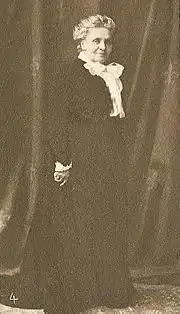Elfrida Andrée
Elfrida Andrée (19 February 1841 – 11 January 1929), was a Swedish organist, composer, and conductor. A 1996 recording on the Caprice label features Andrée's piano quintet, along with a piano sonata, the string quartet in D minor, and vocal music. She was the sister of Swedish opera singer-soprano Fredrika Stenhammar.

Life and career
Andrée was born in Visby to the doctor Andreas Andrée.[1] She was the pupil of Ludvig Norman and Niels Wilhelm Gade. Her sister was the singer Fredrika Stenhammar. An activist in the Swedish women's movement,[2] she was one of the first female organists to be officially appointed in Scandinavia. She began work in Stockholm in 1861 and became the organist at Gothenburg Cathedral in 1867, where she remained the organist until her death.[3] In 1897 she was named leader of the Gothenburg Workers Institute Concerts, establishing her reputation as the first Swedish woman to conduct a symphony orchestra. For her services, she was elected to the Royal Swedish Academy of Music. She died in Gothenburg.[4] During her career, she won the Litteris et Artibus award in 1895, as well as the Idun "Women's Academy" Fellowship in 1908.[5]
Andrée's two organ symphonies are still being played today. Her other compositions include the opera Fritiofs saga (1899, libretto by Selma Lagerlöf), several works for orchestra including two symphonies, a piano quartet in A minor (1870) and a piano quintet in E minor (published in 1865), a piano trio in G minor (1887) (and another published posthumously in C minor), a string quartet in D minor from 1861 and another in A major, pieces for violin (including sonatas in E flat and B flat major) and for piano, two Swedish masses, an 1879 choral ballade "Snöfrid", and lieder.[6]
References
- "Elfrida Andrée". Voiceoflyrics.com. Retrieved 8 December 2014.
- Lewis, Dave. "Elfrida Andrée". Allmusic.com.
- Tanner, Roger. "Elfrida Andrée (1841−1929)".
- "Swedish Musical Heritage - Elfrida Andrée". www.swedishmusicalheritage.com. Retrieved 2021-02-18.
- Tanner, Roger. "Elfrida Andrée (1841−1929)".
- "Elfrida Andrée (1841-1929)". Music Theory Examples By Women. Retrieved 2021-02-18.
External links
- Works by or about Elfrida Andrée at Internet Archive
- Elfrida Andree Piano Quintet in e minor, sound-bites
- Free scores by Elfrida Andrée at the International Music Score Library Project (IMSLP)
- Swedish Musical Heritage - Elfrida Andrée
- Selective discography (in French)
- Songs by Elfrieda Andrée on The Art Song Project
Further reading
- Eva Öhrström, Elfrida Andrée : ett levnadsöde Stockholm: Prisma, 1999. ISBN 91-518-3488-X.
- English translation of Eva Öhrström biographical article (above) https://skbl.se/en/article/ElfridaAndree
- Elfrida Andrée at Svenskt kvinnobiografiskt lexikon
- Elfrida Andree by Elsa Stuart-Bergstrom